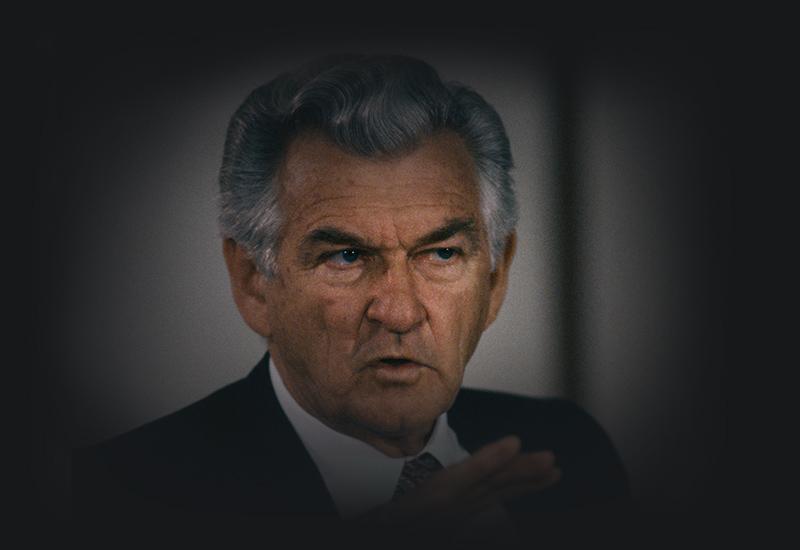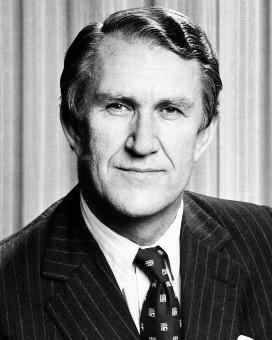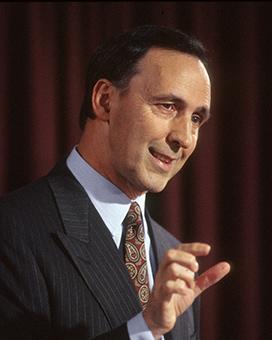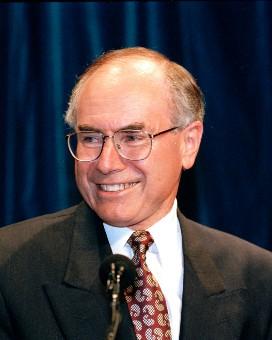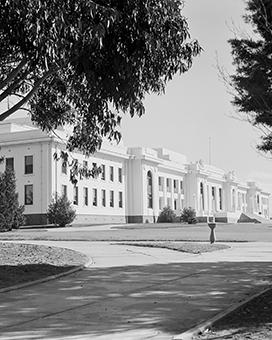Robert James Lee (Bob) Hawke was born on 9 December 1929 in Bordertown, South Australia. He was the youngest of the 2 sons of Congregational minister Clem Hawke and Ellie (Lee) Hawke, a former teacher.
In 1939, after Bob Hawke’s 18-year-old brother Neil died, the family moved to Perth, Western Australia, and settled in the suburb of West Leederville. Hawke attended Perth Modern School, then the University of Western Australia. In 1947, his first year at university, the 17-year-old Hawke had a serious accident on his new Panther motorbike and required critical surgery. Hawke was president of the University’s Student Representative Council and graduated with a Law degree and an Arts degree in 1953. That year, Albert Hawke, Bob Hawke’s uncle, became Western Australia’s Labor Premier.
Hawke went to Oxford University in 1953, as Western Australia’s Rhodes scholar. Abandoning his planned degree, he submitted a thesis on the history of wage-fixing in Australia. He graduated with a Bachelor of Letters in 1955 and returned to Australia in 1956.
On 3 March 1956, he married Hazel Masterson in Perth. They had first met 8 years earlier. Hawke then enrolled in a doctoral program at the Australian National University and the couple moved to Canberra. Two years later, with the degree unfinished, Hawke took a job with the Australian Council of Trade Unions (ACTU). The couple, with their infant daughter, moved to Melbourne and bought a house in Keats Street, Sandringham.
Hawke was the ACTU’s first paid researcher and advocate before the Arbitration Commission. He soon proved his value. He played a key role in the 1959 basic wage decision and then succeeded in a metalworkers’ case before the commission. His workload increased to the point that he was provided with an assistant, Ralph Willis. In 1962, Hawke was a delegate to a conference for nominees from Commonwealth countries, sponsored by the Duke of Edinburgh and held in Canada.
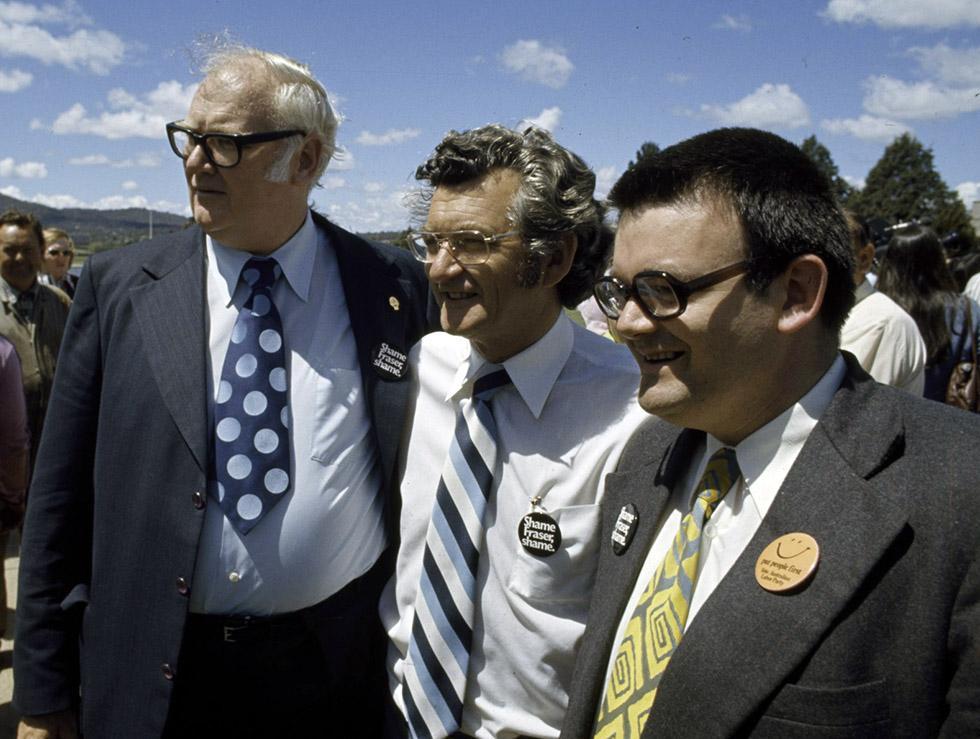
Bob Hawke (centre), president of the Australian Council of Trade Unions, at a lunchtime protest rally in Canberra in November 1975, after Governor-General Sir John Kerr dismissed the government of Gough Whitlam. NAA: A6135, K14/11/75/46
In 1963, Hawke’s first attempt to enter federal parliament failed after he contested the seat of Corio (Victoria) against Liberal minister, Hubert Opperman. In July 1964, the Hawkes moved to a larger house in Royal Avenue, still in the bayside suburb of Sandringham, with their 3 young children. Their fourth child, a son, had survived only a few days after his birth a year before. In 1965, the family spent 3 months in Port Moresby, where Hawke was arguing a wage case for Papua New Guinea’s public servants.
ACTU President 1969–80
When Albert Monk retired as president of the ACTU in 1969, Hawke was elected his successor. During his 10 years with the ACTU, Hawke transformed wage fixing in Australia and was acknowledged as the system’s best advocate. He had developed good relations not only with unionists but also with his opponents, the employers and government representatives. His powers of persuasion were widely recognised, as was his conviviality – measured by copious beers over negotiations in hotel bars. He made strong friendships with Labor Party and trades union colleagues.
In 1971, Hawke travelled to Israel as the first recipient of an award in memory of Senator Sam Cohen. He then travelled to Geneva for a meeting of the International Labour Organisation governing body, of which he had become a member the previous year. From there he arranged to go to Moscow for meetings about the plight of the ‘refuseniks’, Jewish people unable to get permission to leave the Soviet Union. On his return to Melbourne, Hawke delivered the inaugural Cohen lecture. That same year, the ACTU was also heavily involved in anti-apartheid demonstrations against the tour of the South African Springboks' rugby union team.
Also in 1971, Hawke was elected to the federal executive of the Australian Labor Party and was made Father of the Year. In 1972, the Hawkes were both involved in Labor’s campaign for the federal election. They were prominent at the triumphal celebrations when Gough Whitlam led the party to victory – the first Labor government since Ben Chifley was defeated at the 1949 election.
Hawke worked increasingly to resolve rather than instigate industrial disputes. He was active in international labour issues, and in Australia became the most prominent figure in the union movement, with a national reputation as an effective negotiator.
In 1973, Hawke was elected federal president of the Australian Labor Party for a 5-year term. Now president of both the ACTU and the Labor Party, he represented the labour movement and the Labor Party on governing and advisory bodies, such as the Reserve Bank Board, the Australian Population and Immigration Council, and the Monash University Council.
In July 1973, the Hawkes travelled to Singapore, Tehran and Israel for meetings of unionists, and to Geneva for an International Labour Organisation meeting. In 1974, Hawke went to a labour conference in Belgrade, where Hazel Hawke and their children joined him to travel to Greece for a holiday. Holidays were rare, and this one was interrupted by phone calls and negotiations, as usual, on both party and ACTU business. At the Bass by-election in 1975, the loss of Lance Barnard’s seat weakened the Whitlam government.
When Governor-General Sir John Kerr dismissed the Whitlam government on 11 November 1975, Hawke immediately left his Melbourne office for Canberra, and was prominent in both the protest demonstrations and the Labor campaign for the December election. Reflecting his preference for resolving rather than promoting industrial disputes, he held firm against calls for industrial action to protest Whitlam’s dismissal.
During these years, Hawke was fighting a battle against alcoholism. He nonetheless managed a punishing workload. The worst effects of this problem were concentrated within his family life. When they emerged in his work life, they were concealed by close friends and colleagues.
Recognition of his work and achievements grew, both in Australia and overseas. In 1976, Hawke returned to Israel, as a guest of the Israeli government, for the dedication of a forest to him. He was invited to China in 1978 as a leader of the trade union movement and, in January 1979, he was made a Companion of the Order of Australia. In May that year, he travelled to Moscow and Geneva, where he led unsuccessful negotiations on behalf of Soviet Jewish families attempting to emigrate. Invited to deliver Australia’s ABC radio Boyer Lectures during 1979, Hawke chose as his topic ‘The resolution of conflict’.
After a physical collapse in 1979, Hawke began a sustained attempt to conquer his alcohol addiction. In 1980, his popularity in Australia became evident in an opinion poll on preferred prime ministers. Although not even in parliament, he far outstripped both Prime Minister Malcolm Fraser and Leader of the Opposition Bill Hayden.
On 23 September 1980, Hawke announced his intention to make a second attempt to enter federal parliament, and on 14 October was pre-selected for the seat of Wills. He resigned from the ACTU to begin campaigning for the federal election.
Member for Wills 1980
When Hawke won the seat of Wills in October 1980, leader of the federal parliamentary Labor Party Bill Hayden appointed him Shadow Minister for Industrial Relations, Employment and Youth Affairs. Hawke made his first speech in the House of Representatives on 26 November 1980. At the age of 50, he might have been a new parliamentarian, but he was a seasoned, confident and persuasive politician.
In May 1982, the Hawkes travelled to Singapore, London and then Helsinki where Hawke attended an international socialist conference. At the Labor Party’s federal conference in Canberra’s Lakeside Hotel in July 1982, Hawke initiated a challenge to Bill Hayden’s leadership. Hawke lost the Caucus ballot that followed, but the vote was close. The recognition within the party that Hawke’s leadership ability outstripped all others, including Hayden, made a successful challenge just a matter of time. Hawke did not have support from the left wing party faction, but Hayden’s stance against the left’s wish to repudiate uranium mining policy made Hawke a lesser evil.
Senior Labor figures assembled in Brisbane on 1 February 1983 for the funeral of former Prime Minister Frank Forde, with former Prime Minister Gough Whitlam among the pallbearers. After the solemnities, Hayden held a long and emotional meeting with John Button, one of his closest colleagues, and finally agreed to step down. Two days later the Labor Party shadow Cabinet met in Brisbane and Hayden resigned. In Canberra a few hours later, Prime Minister Malcolm Fraser met with the Governor-General to request a double dissolution of the parliament. Fraser had hoped to forestall the change of leadership before the election.
Hawke was elected Labor Party leader on 8 February 1983, and the federal election was called for 5 March 1983. Hawke was Leader of the Opposition for less than a month, and his most urgent task was the brief election campaign. The Labor Party campaign launch was held at the Opera House, Sydney on 16 February, under the slogan ‘Bringing Australia together’.
In the press statement announcing his resignation, Bill Hayden had said that in the current electoral climate, ‘a drover’s dog could lead the Labor Party to victory’. After a 4-week campaign, Hawke led the Labor Party to its greatest election win in 40 years. His parliamentary apprenticeship had lasted just 2 years.
Sources
- D’Alpuget, Blanche, Robert J Hawke: A Biography, Lansdowne Press, Melbourne, 1982.
- Hawke, Bob, The Hawke Memoirs, William Heinemann Australia, Port Melbourne, 1994.
- Hawke, Hazel, My Own Life: An Autobiography, Text Publishing, Melbourne, 1992.
- McMullin, Ross, The Light on the Hill: The Australian Labor Party, 1891–91, Oxford University Press, Melbourne, 1992.
From the National Archives of Australia collection
- Role of R Hawke in the Papua New Guinea local officers’ case, 1967, NAA: A452, 1967/3430

